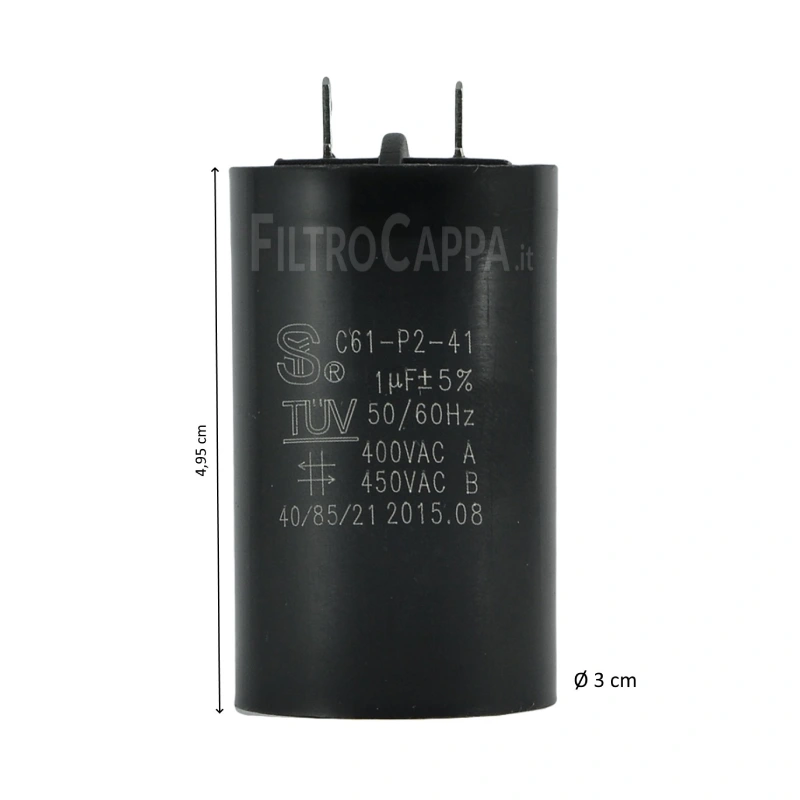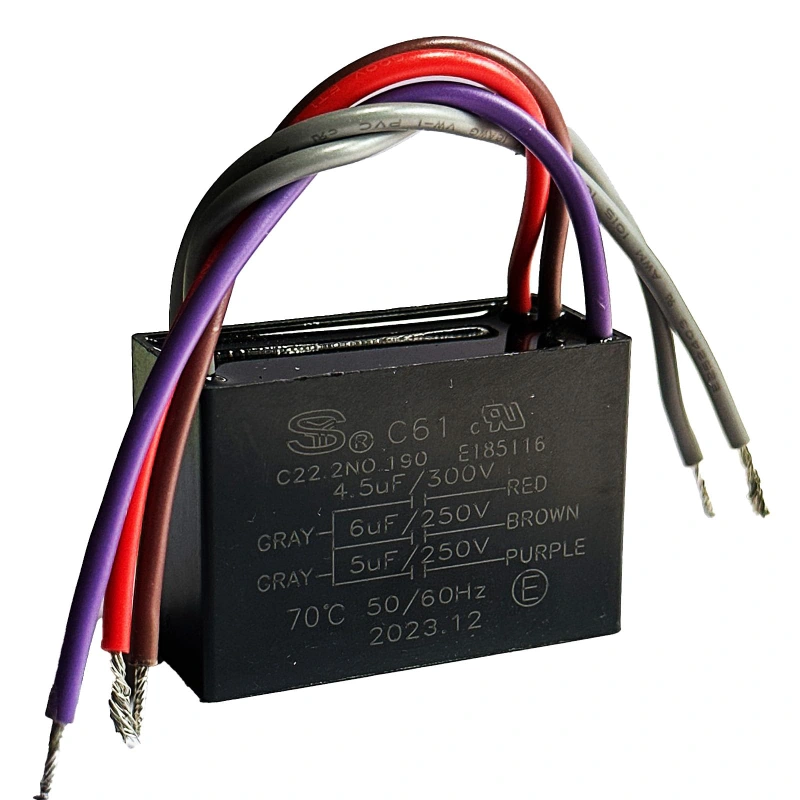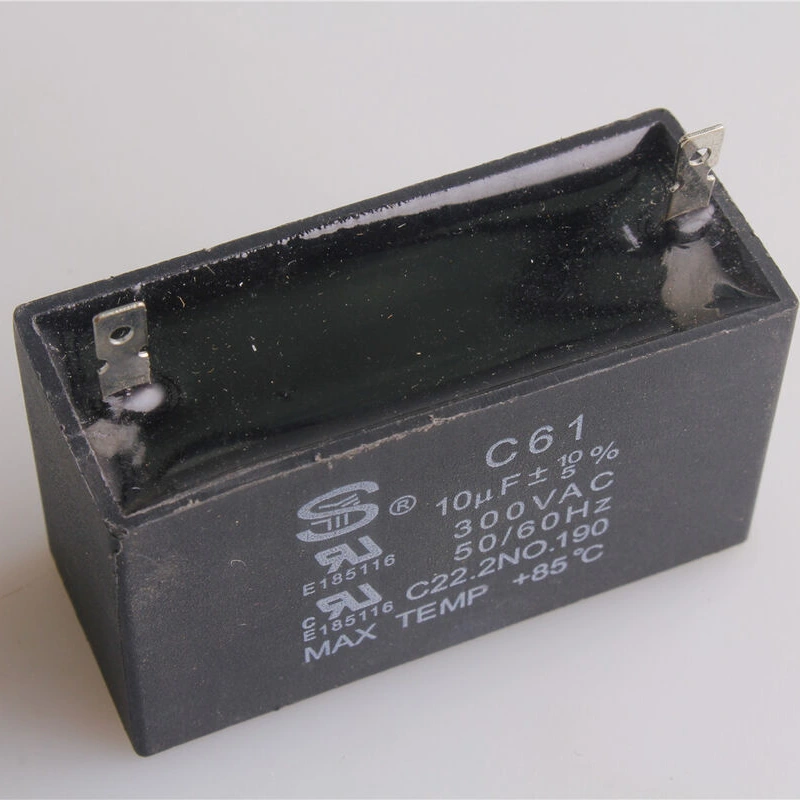C61 Capacitor :Unmatched Quality at Competitive Prices
The c61 capacitor is a small ceramic capacitor with a capacitance of 10,000 pF (0.01 µF). It is widely used in electronic circuits for filtering, decoupling, and energy storage, ensuring stable voltage regulation and signal integrity.
The models used in combination include 4700uf 50v capacitor, 47uf capacitor, 471uf capacitor, 472uf capacitor, 473uf capacitor, high voltage capacitor, aluminum electrolytic capacitor, blown capacitor, filter capacitor, mica capacitor, 50 5 capacitor, 103 capacitor,fan capacitor,audio capacitor. microfarad capacitor.
C61 Capacitor Different Capacitor Values
c61 capacitor
A C61 capacitor is a type of electrical capacitor primarily used in applications such as fans, motors, and appliances where capacitor-assisted starting or running is needed. The C61 designation refers to a specific class of capacitors that are designed for continuous operation in electrical circuits. Typically, C61 capacitors are used to enhance the performance of AC motors and compressors by providing the necessary phase shift to improve motor efficiency and smooth operation. These capacitors are built to withstand high temperatures, making them suitable for heavy-duty applications. When selecting a C61 capacitor, it is essential to consider factors such as voltage rating, capacitance, and physical dimensions to ensure compatibility with the specific device or appliance. Due to their reliability and long service life, C61 capacitors are widely used in household appliances, HVAC systems, and industrial equipment.


C61 Fan Capacitor
A C61 fan capacitor is a specific type of capacitor used in fan motors to regulate speed, reduce energy consumption, and maintain smooth operation. In fan applications, capacitors are vital for starting the motor and keeping it running efficiently. The C61 fan capacitor is designed to handle the electrical demands of fan motors, providing the correct phase shift for optimal motor performance. It is commonly used in ceiling fans, exhaust fans, and other ventilation systems. The C61 fan capacitor helps to improve the efficiency and longevity of the motor by reducing electrical noise and ensuring the motor runs without overloading. When selecting a C61 capacitor for a fan, it’s crucial to choose one that matches the motor’s voltage and capacitance requirements to avoid damaging the motor or reducing fan performance. These capacitors are built to withstand high temperatures and harsh environments, making them ideal for fan applications.
C61 Capacitor 10uF
A C61 capacitor with a capacitance rating of 10µF (microfarads) is commonly used in electrical circuits where moderate capacitance is required for motor or fan applications. This 10µF C61 capacitor is typically used in small to medium-sized AC motors, including those in fans, compressors, and other household appliances. The 10µF value is important because it determines the amount of electrical charge the capacitor can store, influencing the motor’s start-up and operational efficiency. C61 capacitors like the 10µF version are designed to operate in high-temperature environments, making them ideal for use in appliances that generate heat, such as fans and air conditioning units. These capacitors are also built to be durable and reliable, ensuring long service life and minimal maintenance. Proper selection of the 10µF C61 capacitor is essential to ensure the motor runs efficiently and without risk of overheating or failure.

C61 Capacitor Applications and Uses
Consumer Electronics
In consumer electronics, C61 capacitors are widely used in power supply circuits, where they help smooth voltage fluctuations and provide stable operation. They are essential in devices like televisions, audio systems, and gaming consoles, ensuring that the components receive consistent and reliable power. Their compact size and high capacitance make them ideal for managing energy in small electronic devices.
Automotive Industry
C61 capacitors are critical in automotive electronics, particularly in engine control modules (ECMs) and lighting systems. They help reduce voltage spikes and ensure stable power for various automotive components, including sensors, infotainment systems, and electric vehicle batteries. These capacitors contribute to the longevity and efficiency of the vehicle’s electrical system.
Industrial Equipment
In industrial settings, C61 capacitors are used for power factor correction, motor drive systems, and control circuits in machinery. They stabilize voltage fluctuations, improve energy efficiency, and protect equipment from electrical noise. These capacitors are essential for maintaining the smooth operation of industrial machinery, preventing equipment failure, and reducing downtime.
Telecommunications
C61 capacitors play a vital role in telecommunications equipment, including routers, transmitters, and signal processors. They help filter out high-frequency noise and improve the quality of signal transmission by stabilizing power supply voltage. In communication systems, these capacitors ensure reliable, high-speed data transmission and reduce the risk of signal degradation.
C61 Capacitor Capacitor Values and Codes
A C61 Capacitor is a type of ceramic capacitor commonly used in electronic circuits for various applications, including filtering, decoupling, and energy storage. It is important to understand the capacitor values and codes to select the right component for your circuit needs.
Capacitor Values
The value of a C61 capacitor is typically indicated by a three-digit code or a standard value system. The first two digits represent the first part of the value, and the third digit is the multiplier. For example, a capacitor with a code of 103 would have a value of 10,000 pF (picofarads), as the third digit indicates a multiplier of 3 (10³). Common values range from picofarads (pF) to microfarads (µF), and they are typically used for high-frequency filtering and stability.
Capacitor Codes
In addition to the numeric code, capacitors also use a series of letters to indicate tolerance, voltage rating, and temperature characteristics. For example, C may refer to a specific temperature coefficient, such as Class II or Class III, indicating how much the capacitance value may vary with temperature. The voltage rating of the capacitor is essential to ensure it can handle the electrical load in the circuit without failure.
In summary, understanding C61 capacitor values and codes allows engineers and designers to select the correct components for a specific circuit, ensuring optimal performance and reliability.
C61 Capacitor FAQs
A C61 capacitor is a ceramic capacitor often used in electronic circuits for various purposes, such as noise filtering, signal decoupling, and voltage stabilization. It is typically available in different capacitance values and voltage ratings.
The "C61" designation refers to a series of capacitors within the broader category of ceramic capacitors. The "C" in the code can indicate a temperature coefficient, while the "61" could be part of the part number or series identifier, specific to the manufacturer or component line. It is always essential to check the manufacturer's datasheet for detailed specifications.
The value of a C61 capacitor is often indicated by a three-digit code printed on the body. The first two digits represent the first part of the value, and the third digit acts as a multiplier. For example, a code of 104 means 100,000 pF or 0.1 µF (since the multiplier is 10⁴). Tolerance and voltage ratings are often listed separately.
C61 capacitors are typically used in power supplies, communication circuits, signal filtering, and decoupling applications. They help reduce noise, stabilize voltage, and improve circuit performance by providing smooth, steady electrical flow.
C61 capacitors are available in various voltage ratings. The voltage rating should always be equal to or greater than the voltage the capacitor will experience in the circuit. Typical voltage ratings range from 25V to 500V.